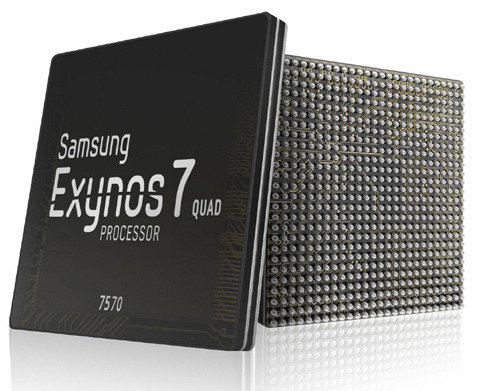Samsung mass produces 14-nano AP products
Samsung mass produces 14-nano AP products
Posted August. 31, 2016 07:13,
Updated August. 31, 2016 07:39

Samsung Electronics has mass produced the industry's first 14-nano processed low cost application processor "Exynos 7570." With Chinese companies churning out budget smartphone market, Samsung is aiming to aggressively target the lower cost mobile AP market.
Mobile AP is a system chip that acts as brain of mobile phones, just like the CPU of computers. 1 nano is equal to one billionth of a meter. The lower the unit, the narrower the width of a circuit enabling a shorter distance of movement of electricity, which in turn enables faster speed and lower power consumption. When a chip is made using the 14 nano process, efficiency grows by 70 percent compared to the existing 28 nano process and power efficiency can be enhanced by more than 30 percent.
Only Samsung can currently mass produce 14-nano mobile AP. The South Korean tech giant mass produced 12-nano-based premium mobile AP ahead of releasing Galaxy S6 in February last year. Samsung released a mid-priced product in February this year and went further to unveil a low cost one.
Low cost 14-nano mobile AP enables full HD video filming and play. It supports WXGA (1280×800) resolution, 8 million front and back and 13 million pixel camera resolution. "Lower cost smartphone users can now enjoy high resolution and high quality contents," a Samsung Electronics employee said.
Samsung is releasing products in various prices to diversify its customer base. Until now, Samsung has struggled amid Qualcomm and Chinese companies leading the global smartphone AP market. But it is gradually expanding market share helped by its 14 nano competitiveness. Following mass production of 14 nanos, Samsung is not only expanding its sales of self-developed Exynos brands but also the foundry market. Key example is Qualcomm, which had been commissioning production to Taiwan's TSMC, requested Samsung for its Snapdragon 820.
Samsung Electronics' system LSI division that makes mobile AP has succeeded in improving earnings thanks to its customer diversification strategy. It recovered a double digit market share for the first time in three years in the first quarter this year, and made a surplus of 200 billion-300 billion won (180-270 million dollars) in the second quarter. This is a strong rebound from two years ago when it was suffering from losses. Recently, Samsung Electronics supplied mobile AP to China's virtual reality firm DeePoon.
김지현기자 jhk85@donga.com







